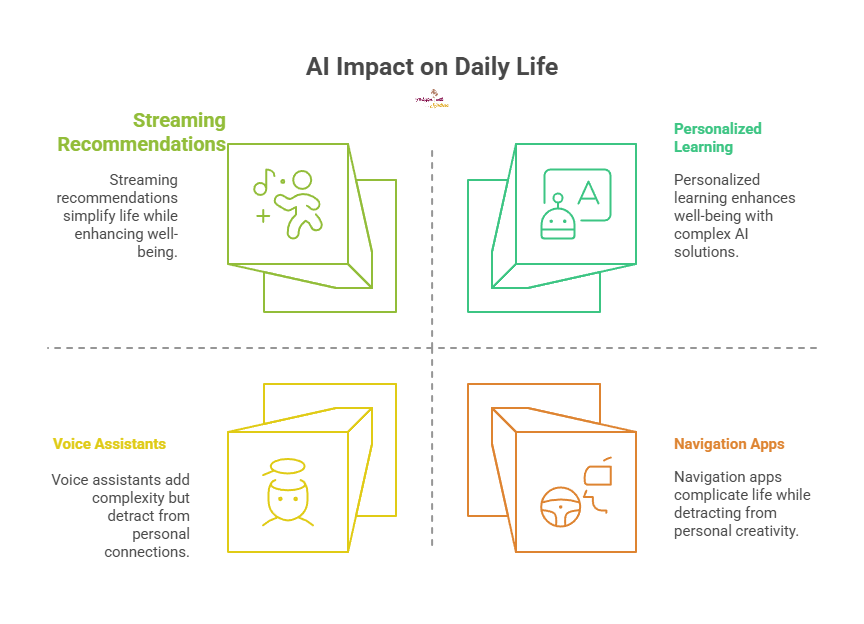Beyond the Algorithm: AI for a Better Us
Exploring AI's Potential to Enhance Human Well-being and Connection
"AI isn't just about what machines can do; it's about how they can help us become more, do more, and connect more authentically." — Nadina D. Lisbon
Hello Sip Savants! 👋🏾
A recent BBC report highlights a significant stride in healthcare, with hospitals increasingly using AI for patient scans to enhance diagnostic capabilities. This development, along with broader discussions about technology's influence, underscores a growing public interest in how AI can solve real-world problems. This shift emphasizes a desire for technology that genuinely improves our lives. Let's dive into some fascinating ways AI is stepping up to the plate, always keeping the human element at the forefront.
3 Tech Bites
🏥 AI Revolutionizes Patient Scans
Hospitals are increasingly adopting AI technology to analyze medical images such as X-rays, CT scans, and MRIs. This allows for faster and more accurate detection of abnormalities like tumors or fractures, often spotting issues that might be missed by the human eye.3 This leads to earlier diagnoses, more precise treatment plans, and ultimately, improved patient outcomes, showcasing AI's profound impact on precision medicine.
🦟 Mosquito Watch with AI
AI is being deployed in innovative ways to combat mosquito-borne diseases. By analyzing data from traps, weather patterns, and even citizen science reports, AI models can predict mosquito population surges and identify high-risk areas. This allows public health officials to target interventions more effectively, potentially preventing outbreaks of illnesses like dengue and malaria.1 This shows how AI can be a powerful tool in preventative healthcare, protecting communities at scale.
🛍️ Retail's Human Touch
In the world of retail, AI is often seen as a tool for efficiency, but its real power lies in enhancing the human experience. AI-powered analytics can help retailers understand customer preferences and personalize interactions, leading to more meaningful connections between brands and consumers.2 Think of it as AI enabling more thoughtful and personalized service, rather than replacing human interaction.
5-Minute Strategy
🧠 Your Personal AI Impact Audit
Take five minutes to consider how AI currently impacts your daily life and how you'd like it to.
Identify 3 current AI touchpoints: (e.g., streaming recommendations, voice assistants, navigation apps). How do they make your life easier or more complex?
Brainstorm 1 problem AI could solve for you: (e.g., managing your calendar, finding new hobbies, personalizing learning). Think big or small!
Reflect on the "human" aspect: For each, how does AI interact with your personal well-being, connections, or creativity? Does it enhance or detract?
1 Big Idea
💡 AI as an Equalizer: Bridging the Digital Divide and Fostering Inclusive Futures
The digital divide remains a profound challenge globally, separating those with access to technology and its benefits from those without. This gap exacerbates existing inequalities in education, economic opportunity, and social participation. However, AI, often perceived as a technology that could widen this divide, holds immense potential as an equalizer, capable of democratizing access to essential services and information for marginalized communities. The key lies in deliberately designing and deploying AI with inclusivity at its core.
Consider the realm of education. For communities with limited access to traditional schooling or qualified teachers, AI-powered educational platforms can offer personalized learning experiences. These systems can adapt to individual learning paces and styles, provide content in various languages and formats, and even offer virtual tutoring, effectively bringing quality education to remote or underserved areas. This isn't about replacing human educators, but about augmenting their reach and providing foundational learning opportunities where they might otherwise be absent.
In economic empowerment, AI can create new pathways to opportunity. Imagine AI-powered tools that provide vocational training for in-demand skills, accessible through mobile devices, or AI-driven platforms that connect rural artisans with global markets, bypassing traditional intermediaries. Micro-lending applications utilizing AI to assess creditworthiness in communities lacking formal banking infrastructure could unlock vital capital for small businesses. These applications can foster entrepreneurship and economic independence, lifting communities out of poverty.
Furthermore, AI can improve access to critical information and services. AI-powered translation tools can break down language barriers, allowing individuals to access healthcare information, legal advice, or government services in their native tongues. AI can also power predictive analytics for disaster preparedness in vulnerable regions, or optimize resource allocation for humanitarian aid, ensuring that support reaches those who need it most, even in challenging environments.
However, leveraging AI as an equalizer requires proactive measures to prevent unintended consequences. We must address potential biases in AI algorithms that could inadvertently perpetuate discrimination. Ensuring data privacy, promoting digital literacy, and fostering local participation in the design and implementation of AI solutions are crucial. The goal is not just to provide technology, but to empower communities to shape their own digital futures, ensuring that AI becomes a tool for empowerment, not control. By consciously directing AI's capabilities towards bridging divides, we can build a more equitable and inclusive global society where everyone has the opportunity to thrive in the digital age.
Share your thoughts!
P.S. If you found these AI insights valuable, a contribution to the Brew Pot helps keep the future of work brewing.
P.P.S. Know someone else who could benefit from a sip of CRM wisdom? Share this newsletter and help them brew up stronger customer relationships!
Resources
“Preventing Mosquito-Borne Diseases with AI and Citizen Science.” - The Smart City Journal.
“Hospitals scan more patients with AI technology” - BBC News
Sip smarter, every Tuesday. (Refills are always free!)
Cheers,
Nadina
Host of TechSips with Nadina | Chief Strategy Architect ☕️🍵


